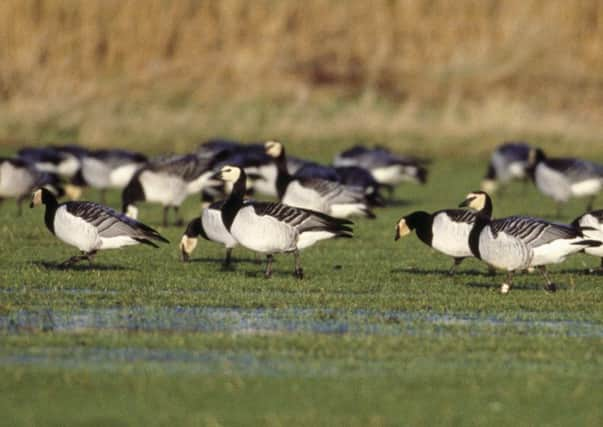RSPB unveil plan to extend reserve for barnacle geese


Every year around 400,000 barnacle geese fly from their nesting grounds in Svalbard, Norway, to spend the winter on the Solway Firth.
A quarter of them settle at a 370-hectare nature reserve at Mersehead in Dumfries, which has been owned by RSPB Scotland for the past two decades.
Advertisement
Hide AdAdvertisement
Hide AdNow the conservation charity plans to extend the site by a further 112 hectares to provide a bigger haven for the geese and other rare and important wildlife that call it home.
The extra land will link two existing areas at the reserve.
As well as benefiting the barnacle geese, enlarging the site will help the charity safeguard important habitat for endangered curlews and the country’s rarest amphibian, the natterjack toad.
The site hosts the only Scottish population of the toads, which can be heard in summer along with yellowhammers, linnets and lapwings.
Pintails, teals and widgeons flock to Mersehead in the autumn, while waders such as oystercatchers, golden plovers and curlews join the geese in winter.
Incorporating the extra land will also offer opportunities for better access tracks for visitors to enjoy the Solway Firth scenery and wildlife.
The charity needs to raise £285,000 by the end of this month to secure the deal.
“RSPB Scotland Mersehead is an outstanding place for wildlife, and now we have the opportunity to make it even bigger and better for some of Scotland’s rarest species and the many others that make their home there,” said Stuart Housden, director of RSPB Scotland.
“Since becoming an RSPB Scotland reserve in 1994 Mersehead has been transformed from intensive agricultural land to wetlands, reedbeds and salt marshes teeming with life, whilst also introducing wildlife-friendly farming to ensure that the birds, mammals, amphibians and insects found there can thrive in harmony with these sympathetic farming systems.
“We’re immensely proud of what we have achieved here so far and any donations made to this appeal will help allow us to continue this transformational journey that began a generation ago.”